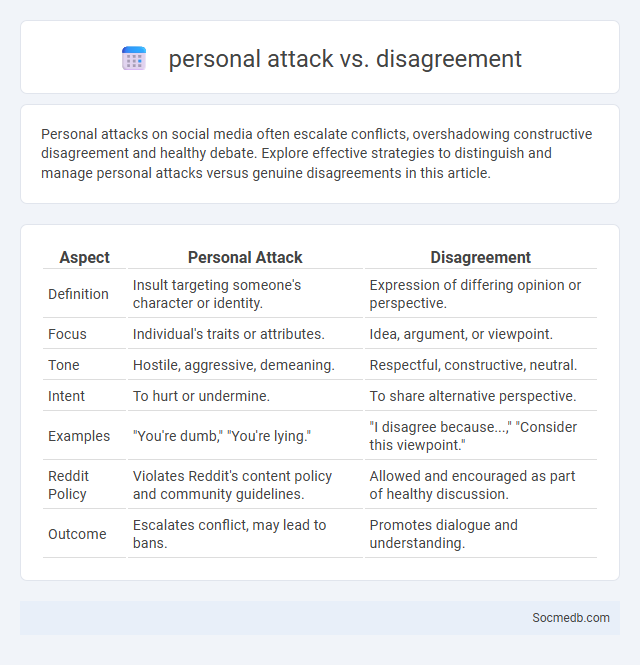
Photo illustration: personal attack vs disagreement
Personal attacks on social media often escalate conflicts, overshadowing constructive disagreement and healthy debate. Explore effective strategies to distinguish and manage personal attacks versus genuine disagreements in this article.
Table of Comparison
| Aspect | Personal Attack | Disagreement |
|---|---|---|
| Definition | Insult targeting someone's character or identity. | Expression of differing opinion or perspective. |
| Focus | Individual's traits or attributes. | Idea, argument, or viewpoint. |
| Tone | Hostile, aggressive, demeaning. | Respectful, constructive, neutral. |
| Intent | To hurt or undermine. | To share alternative perspective. |
| Examples | "You're dumb," "You're lying." | "I disagree because...," "Consider this viewpoint." |
| Reddit Policy | Violates Reddit's content policy and community guidelines. | Allowed and encouraged as part of healthy discussion. |
| Outcome | Escalates conflict, may lead to bans. | Promotes dialogue and understanding. |
Understanding Personal Attacks
Personal attacks on social media often involve targeted insults or derogatory comments aimed at an individual's character rather than their ideas. Recognizing these attacks requires distinguishing between constructive criticism and harmful behavior, which can escalate conflicts and damage reputations. Awareness of the psychological impact and the potential for misinformation helps users develop strategies to respond appropriately and maintain healthy online interactions.
Defining Disagreement in Discussions
Disagreement in social media discussions occurs when participants express contrasting opinions or conflicting viewpoints on a subject, often fueled by diverse perspectives and background experiences. Understanding the nuances of disagreement involves recognizing respectful dissent, avoiding personal attacks, and focusing on the content of the argument rather than the individual. Your ability to distinguish constructive disagreement from harmful conflict enhances meaningful exchanges and promotes a healthier online community.
What Constitutes a Rule Violation?
A rule violation on social media includes actions such as posting hate speech, sharing false information, engaging in harassment or bullying, and distributing explicit or harmful content. Platforms enforce community guidelines that prohibit these behaviors to maintain a safe and respectful online environment. Violations may result in content removal, account suspension, or permanent banning.
Key Differences: Personal Attack vs Disagreement
Personal attacks on social media target your character or intentions, often involving insults or derogatory language that can escalate conflicts and damage reputations. Disagreements focus on opposing ideas or opinions, fostering constructive dialogue without attacking an individual's identity. Understanding these key differences helps you respond appropriately and maintain respectful online interactions.
Identifying Rule Violations in Communication
Social media platforms employ advanced algorithms and human moderators to identify rule violations in communication, including hate speech, harassment, and misinformation. Your content is continuously scanned through natural language processing and pattern recognition technologies to ensure compliance with community guidelines. Prompt detection of these violations helps maintain a safer and more respectful online environment for all users.
Emotional Impact of Personal Attacks
Personal attacks on social media trigger intense emotional responses such as anxiety, depression, and lowered self-esteem, significantly affecting mental health. Exposure to online harassment can lead to long-term psychological trauma, increasing risks of social withdrawal and even suicidal ideation. The pervasive nature of digital platforms amplifies the emotional toll, making resilience and support systems crucial for mitigating harm.
Healthy Debate: Managing Disagreements Respectfully
Healthy debate on social media platforms fosters constructive dialogue by encouraging users to express diverse opinions while maintaining respect and empathy. Employing active listening and avoiding inflammatory language reduces misunderstandings and promotes mutual understanding among participants. Establishing clear community guidelines and moderation helps create a safe environment where disagreements can be navigated thoughtfully without escalating into hostility.
Recognizing Subtle Forms of Rule Violations
Recognizing subtle forms of rule violations on social media requires keen attention to behaviors such as disguised hate speech, veiled threats, or coded language that may not be immediately obvious. Algorithms and content moderators often rely on semantic analysis and context recognition to identify these nuanced infringements. Understanding these complexities helps you navigate platforms safely and maintain compliance with community standards.
Strategies for Preventing Personal Attacks
Implementing clear guidelines and moderation policies on social media platforms effectively reduces personal attacks by setting boundaries for acceptable behavior. Utilizing AI-powered content filters and prompt reporting systems helps identify and remove harmful comments swiftly, fostering a safer online environment. Encouraging community engagement through positive reinforcement and digital literacy education empowers users to recognize and counteract personal attacks proactively.
Maintaining Productive Dialogue in the Face of Conflict
Maintaining productive dialogue on social media requires clear communication strategies that prioritize respect and empathy despite differing opinions. Effective conflict resolution techniques, such as active listening and acknowledging diverse perspectives, help reduce misunderstandings and promote constructive conversations. Leveraging platform tools like moderation and reporting also supports a safer environment conducive to healthy exchanges.
 socmedb.com
socmedb.com